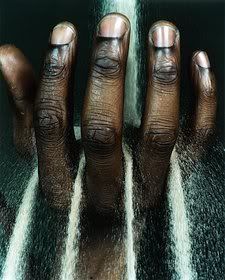West Indians vs. African Americans vs. Africans
I saw this article at BlackPlanet and I thought it was quite interesting. Well, I don't know if it's interesting or just... divisive.
 The author, Dan Woog, obviously makes a point, but I think many times Black people are looking for reasons to divide themselves. Dr. Craig Polite makes an... ahem... interesting point about the relationship between West Indians and African Americans.
The author, Dan Woog, obviously makes a point, but I think many times Black people are looking for reasons to divide themselves. Dr. Craig Polite makes an... ahem... interesting point about the relationship between West Indians and African Americans.He said, "It's more like an undertone of conflict, particularly between those born in the Caribbean and those born in the US. It doesn't surface a lot, but people from the islands have the impression they're a little bit smarter, a little more superior. It doesn't get talked about, but it's there."
Mr. Polite is most likely African-American because while he readily points out the ills of everyone else, he doesn't say anything about the attitudes of African-Americans, 'cause if you're going to say one, you better say two. I'm sure that African-Americans have their own set of issues that unnerve West Indians and Africans, but Mr. Woog forgot to mention any of them -- subjective journalism at it best.
Yes, I'll agree that West Indians have a certain self-confidence. A lot of our parents taught us to believe in ourselves -- whether we were born on an island or in North America. But there is something to be said for the West Indian work ethic. Many times people from the Islands come to North America with absolutely nothing but the desire to do something for themselves and we're condemned?
Chupse. That's a load of ignorance.
Larri Mazon most ignorantly says, "(Islanders) don't know an employer may stab you in the back, whereas American-born blacks might see that willingness to work so hard as a 'yes, massa' attitude."
But wait *anger starts to build*.
We 'Islanders' are a pack of idiots? We don't have trouble at work back in Barbados, Jamaica, Trinidad or any other island in the Caribbean? Maybe back in the day we thought that the streets of North America were paved in gold, but we aren't fools. We know that we are the minority in North America. We know that we have to work twice or three times are hard as a white person to get as far. It's annoying that someone would make it seem like these little backwards, fresh off the boat Islanders don't know what the hell they're doing.
Sigh.
You see, these are the things that cause division in the Black community. Whether you are from St. Lucia, New York, Toronto or Ghana, the first thing that white people will see is your skin is Black. They could care less about our intracultural arguments. We are all the same -- we were just taken off the boat at different stops.
It's divide and conquer -- why is this article even necessary? It sounds like the African-Americans in this article are acting 'superior'.
Anyway, read for yourself. I'd love to read comments.
Intracultural Conflicts
By Dan Woog, Monster Contributing Writer, 05/09/05
In the world of 21st-century demographic descriptors, "African American" seems straightforward: If your skin is black, you trace your ancestry back to Africa, and if you're in America, you are American.
But society has never viewed race in such simple terms. Today, recognition is growing for the historical and cultural differences among US-born African Americans, those who emigrated from the Caribbean and recent arrivals from Africa. As foreign-born blacks grow increasingly common in the workplace, intracultural conflicts may also increase.
The percentage of those with black skin who are foreign-born in the US rose from 4.9 percent to 6.7 percent between 1990 and 2000, according to Census Bureau data analyzed by Susan Weber of Queens College, as reported in the New York Times on August 29, 2004.
An Undercurrent of Tension
Dr. Craig Polite, a clinical and industrial psychologist, calls it "tension with a small 't.' It's more like an undertone of conflict, particularly between those born in the Caribbean and those born in the US. It doesn't surface a lot, but people from the islands have the impression they're a little bit smarter, a little more superior. It doesn't get talked about, but it's there."
Cynthia Swift, who teaches multicultural issues in the Graduate School of Education and Allied Professions at Fairfield University in Fairfield, Connecticut, and is coordinator of the Academic Advantage program, agrees. "The legacy of colonialism impacts each group, along with how people are introduced to and have access to work," she says. "People born in Africa have a different perspective on opportunities and rights at work than those who were born here, who have their own perspective on this country's history of discrimination."
All three groups share "misinformation and a lack of understanding of each other," she adds.
The Historical Legacy
When African Americans living in the South moved north in the '30s and '40s to fill low-paying jobs, they fought for their rights, demanded access to better jobs and were often unwilling to continue ill-paying work under poor conditions.
When recent immigrants reached the US, some with good educations and willing to start at the bottom and work several jobs to achieve success, some employers viewed them as "better workers, with better attitudes" than African Americans, says Swift. It worsened in hard economic times when more people vied for fewer jobs. And the situation is exacerbated in communities where young American-born blacks think, "it's better to be cool than smart," she explains. Comedian Bill Cosby decried this phenomenon when speaking at a college graduation in spring of 2004.
Majority to Minority
"People from the islands grow up as part of the dominant culture," says Larri Mazon, director of Multicultural Relations at Fairfield University. "They come from a country run by people who look like them. They don't understand what it's like to be seen as not a valid contributor to society. When they get here, they may pick up on the stereotypical attitude toward blacks and think, 'I'm not born here. I'm not like them.'"
African-born immigrants also come from countries where people are physically homogenous. Because of visa requirements and immigration restrictions, they often arrive here with skills that immediately vault them into the upper echelons of business.
Mazon notes that he is talking primarily about African-born men. Their male-dominated culture can mean chauvinistic attitudes. "I've heard many complaints from black women about male African supervisors," he says.
Resentment also extends to immigration policies that allow Caribbean islanders to work what Mazon calls "16 jobs."
"Employers gravitate toward people who will do that," he explains. "(Islanders) don't know an employer may stab you in the back, whereas American-born blacks might see that willingness to work so hard as a 'yes, massa' attitude."
Common Ground
So can a black community exist in the workplace? Yes, says Polite, though it is "in the background, not up front."
"A lot of black folks get together in part for support, and perhaps as a reality check against what they think they see and feel (from non-blacks)," he adds. "We like being able to speak a common language and let our hair down. Our conversations have a slightly different slant. In the end, no matter where they're from, when black folks get together, we're all in the mix."



9 Comments:
Urban Sista,
It is refreshing to know that there are other educated african americans out in the world. Your bookmarked.
.alois
50 cent is a punk too. Good call on that!
btw I am a brotha, so don't take the above comment as if someone else was saying it.
that article was half-wack. but glad to see you've posted something new! LOL
@alois - glad you enjoyed. Stop by anytime!
@marlo - thanks miss ;) I've been enjoying everyone else's posts, I haven't been writing my own.
ok I just noticed this article. and its a bunch of crap. its poorly researched and put together.
yep there are some issues between africans, west indians and african americans. Why shouldnt there be. There is not one homogeneous white culture why should there be one for black folks? irish folk aint scottish aint german likewise nigerians aint bajan aint black folk from south of the mason dixon. Yes there will be some issues that arise .
For a lot of reasons, that the comments section is not the appropriate forum to discuss, I fully agree with Larri Mazon on the first two paragraphs of the "Majority to Minority" section of the reprinted article.
The article was so so, but a great post!
Thanks for the comments folks! I think one of the biggest issues in this article is that only one point of view is discussed. It is necessary to approach an objective piece from everyone's viewpoint -- if Mr. Woog had interviewed African-born and West Indian born scholars, we may have had an good piece of journalism here.
To me, this is just a pity party and a way to lay blame. When Mexican president Vincente Fox made his comment about Blacks in the States, I'm sure Africans and West Indians didn't think they weren't included. Heck, I live in Canada and I was offended by that.
Anyway, as jdid says, we are from various cultural backgrounds -- why shouldn't we have our differences?
I can agree with the article, to an extent. I find that Americans believe that all immigrants -- regardless of their race -- have more breaks than they do. Even African-Americans feel this way. I say this because I've spent a lot of time in the States, and I've had one person tell me that immigrants get tax breaks. I'm still wondering what he was talking about, because all now my man can't prove what he's saying is true.
I agree, as a Canadian born on Jamaican parents, that West Indians don't view themselves as being the same as African-Americans. We view ourselves as hard-working, and if we believe the common stereotype towards African-Americans, they can be seen as lazy and unmotivated. Unwilling to pull themselves out of a largely effed up economic sitution.
West Indians almost believe that African-Americans are not motivated to improve their lives. If you work hard, life will be better. Because American history has shown that African-American have had it rough, the West Indian attitude is that you work hard and you get far.
It's not always the case in the US, and plus, it seems to me that their system really is designed to keep blacks at a lower level.
At the same time, in Canada, African-born people probably view West Indians in the same way that West Indians view African Americans in the U.S.
I am not happy with what the article has to say, but by spending time in the States, I see that a great deal of what the author says holds some truth.
Post a Comment
<< Home